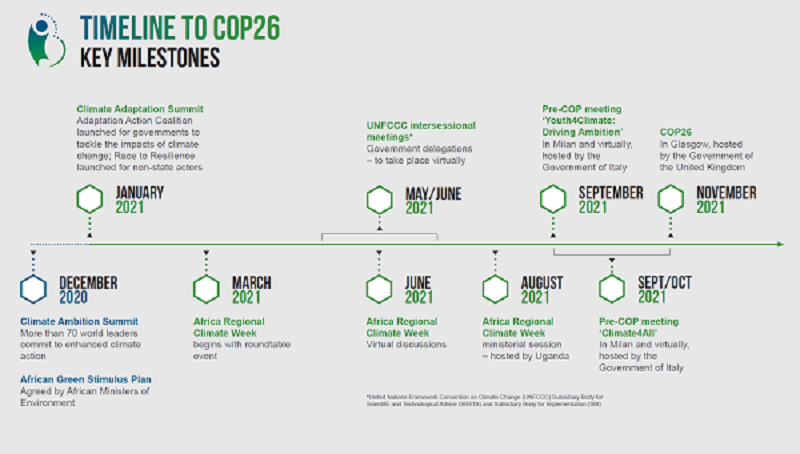Milestones for Malawi on the road to COP26
The Covid-19 pandemic understandably absorbed a lot of public policy attention in 2020. Like many other events, the Conference of Parties to the United Nations Framework Convention on Climate Change (UNFCCC COP26), due to take place in November, was postponed until 2021.
The climate continues to change
Of course climate change - the phenomenon that the UNFCCC aims to address – did not take a break. The UNEP Emissions Gap Report 2020 shows that the Covid-19 pandemic only caused a brief dip in carbon dioxide emissions and that, globally, we are still on a path to exceed 3C global average temperature increase this century.
Even the high number of national claims by countries – including Malawi - to pursue net zero carbon emissions by 2050 is unlikely to keep us on track with the Paris Agreement commitment to limit global warming to well below 2C and pursuing 1.5C. In light of this it is essential that we take the opportunity of Covid 19 to build back better and ramp up commitments to climate action – both mitigating the causes of climate change, and adapting to its consequences.
Malawi’s NDC and NAP in preparation for COP26
A number of milestones and events are taking place in 2021 in the run up to the postponed COP26 that will now take place from 1-12 November in Glasgow. All countries have been asked to revise their Nationally Determined Contributions (NDCs) – or documents that outline efforts to reduce national emissions of greenhouse gases and adapt to the impacts of climate change. Malawi intends to submit its revised NDC in March. The National Adaptation Plan (NAP) is also under development.
Negotiating platforms, sessionals, campaigns and initiatives
This week will see launch events for this year’s Regional Climate Weeks – events that focus on managing climate risk and taking advantage of opportunities for transformation. The Africa Regional Climate Week, hosted this year by the government of Uganda, will be a virtual event from 15-18 June, followed by a ministerial segment from 9-10 August.
Other opportunities for government engagement in the UNFCCC process will come through sessional meetings for the subsidiary bodies under the UNFCCC – the Subsidiary Body on Implementation and Subsidiary Body on Scientific and Technical Advice. The first sessional is likely to be scheduled for government negotiating team members from 31 May-10 June, although the full details are still to be published by the UNFCCC.
The Italian government, which shares the COP26 Presidency with the United Kingdom, will host preparatory meetings in Milan and virtually, including a special youth summit, in late September and early October 2021.
Malawi is also part of several high level campaigns that have been set up to increase climate action in the run up to COP26, all of which will be scheduling various events and activities in 2021.
Malawi is a founding member of the Adaptation Action Coalition. This coalition, which was launched by the UK at January’s Climate Adaptation Summit with the aim of ensuring that political commitments made under the 2019 UN Call for Action on Resilience and Adaptation translate into adaptation on the ground, now has 122 countries signed up.
Malawi is also participating in the LDC Initiative for Effective Adaptation and Resilience (LIFE-AR). LIFE-AR aims to develop and drive forward climate action in line with LDC priorities and needs, and put forward a strong case for climate finance that delivers climate action at scale, building on examples of good practice.
For non-government stakeholders who wish to demonstrate commitment to climate action, there is the Race to Resilience. The Race to Resilience-heralded as the adaptation equivalent of the Race to Zero-aims to mobilise a range of non-state actors to strengthen the resilience of 4 billion people in vulnerable communities by 2030. Applications must pledge commitments to build resilience, plan to put them in place, proceed to pursue immediate action, and then publish action annually, starting from COP26.
Currently only coalitions can apply to join the Race to Resilience – but by March 2021 there will be an option for individual companies, cities, regions, NGOs and organisations to join an approved initiative.
Download the BRACC Hub's timeline for COP26 key milestones, below! Click on the link to download pdf.

